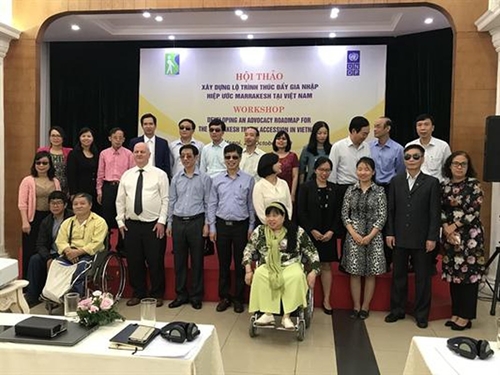Addressing the workshop 'Developing an advocacy roadmap for the Marrakesh Treaty accession in Vietnam’ in Hanoi on October 29, Thu said documents and books are very important means for people to access information, practice skills, improve their quality of life and contribute to society.
However, the number of books and newspapers in these formats is still very small compared to the need.
    |
 |
|
Delegates in a group photo |
The Marrakesh Treaty paves the way for enabling those who are visually impaired or otherwise print disabled to access published works.
The treaty enables the production, distribution, importation and exportation of accessible format copies without having to ask for right holders’ permission. It also provides reassurances for the publishing industry and the author.
Vietnam is not yet a party to the treaty, so people who can't read normal documents have difficulties in accessing literature works that were made public, he said.
According to Catherine Phuong, Assistant Resident Representative of United Nations Development Program Vietnam, less than 1 percent of published books in developing countries are accessible to people with print disabilities, a situation often referred to as a “book famine” which causes serious consequences.
The book famine can exclude persons with disabilities from access to education, employment, health care, culture and participation in political, economic and social activities. These factors contribute to the high rate of poverty among them.
The Marrakesh Treaty would help end book famine and realize the principle of “leaving no one behind” of the UN's Sustainable Development Goals, she said.
Improving access to published works in accessible formats would increasingly become a critical issue in Vietnam, said Pham Thi Hai Ha, deputy head of Department of Social Assistance under the Ministry of Labor, Invalids and Social Affairs.
According to the latest census announced by the General Statistics Office of Vietnam, 6.2 million people aged 2 years and above live with disability. Vision disabilities were found to be the most prevalent types of disability, accounting for 1.03 million.
Vietnam’s population is ageing very fast, which is likely to increase the number of the elderly with vision impairments and print disabilities.
Improving accessibility for persons with disabilities, including with regards to information and knowledge, is an essential element for disability-inclusive societies and fulfilling the basic rights spelt out in the Convention on the Rights of Persons with Disabilities that Vietnam is a party to, according to Ha.
Source: VNA